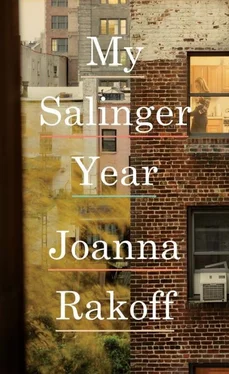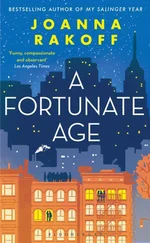But probably the largest group of fans were teenagers, teenagers expressing a sentiment that could be summed up as “Holden Caulfield is the only character in literature who is truly like me. And you, Mr. Salinger, are surely the same person as Holden Caulfield. Thus, you and I should be friends.” Schoolgirls professed their love for Holden. They understood Holden, they explained, and they wished they could find a boy like him, someone who understood the hypocrisies of the world, someone who understood that people have emotions , but all of the guys they knew were morons like Stradlater. “My mother says you won’t write back,” wrote a Canadian high school girl, “but I told her you would. I know you will, because you understand what it’s like to be surrounded by phonies.”
These young people deployed language that I knew derived from The Catcher in the Rye . The repeated use of “goddam” and “crumby” and “as hell” and, of course, “phony.” The boys, I suppose, inclined more toward such imitation than the girls, for the boys wanted to be Holden, while the girls wanted to be with Holden.
One letter caught my eye:
I’ve read your book The Catcher in the Rye three times now. It’s a masterpiece, and I hope that you’re proud of it. You certainly should be. Most of the crap that is written today is so uncompelling it makes me sick. Not too many people have anything to write that even approaches sincerity.
The flat-out nerve of this particular kid—who was, I checked, from Winston-Salem, North Carolina—impressed me. Who writes to possibly the most famous living American writer to inform him that his beloved, best-selling book is a masterpiece and he should be proud? Amazing. But the boy’s brio came straight from Holden. He was hoping to impress Salinger with his likeness to Salinger’s hero.
I was finishing this letter—eventually, he gets around to seeking romantic advice from Salinger (“I used to get nervous as hell around girls”)—when Hugh returned, materializing at my desk so silently that I started, as if he were a ghost. “I just realized,” he began. “You should actually read them.”
“The letters?” I asked, gesturing to my desk, which was covered with stationery.
“Yeah. Just in case.” For a moment he stood up perfectly straight, as if he might balance a book on his head, then his normal slouch returned. “They’re mostly harmless, but occasionally we’ll get a death threat. Back in the ’60s, Salinger got some pretty scary letters. Threatening him. And his kids.” He grimaced.
“What should I do,” I asked, “if I find something scary?”
He considered. “You can bring them to me. I’ll decide if it’s worth bothering your boss. We’ve been pretty careful since the Mark David Chapman thing.” I nodded, knowingly, though it was only later that the significance of this name would come to me, with a shudder: Mark David Chapman, the man who’d shot John Lennon, then sat down on the steps of the Dakota and read The Catcher in the Rye . When the police confiscated the book, they found he’d scrawled “This is my statement” on the title page. Holden Caulfield, he said, had made him do it.
I gestured to my desk, the letters piled on it, robbed of their envolopes. “I’ve been reading them,” I said. “I was curious.”
“Great,” said Hugh, but he didn’t leave. Did my face, my tone, betray something? Some sentiment of which I wasn’t even aware? “Don’t get too caught up in them.”
When I got home that night, the apartment was empty. Don was likely at the gym. He had a big match in a couple of weeks and had started running miles each day to get his weight down, training every night. I put on water for pasta and grabbed a book off his desk—Martin Amis’s London Fields , which I’d taken out of the library the previous week, only to have Don claim it. Underneath I found a letter, in Don’s cramped penmanship. For a brief moment, a flicker of a moment, I thought this letter was meant for me, that Don had left it under my book as a romantic gesture. “My dearest, mi amor,” I read. Oh God , I thought, dropping it on the desk as if it were aflame. Those four words were enough. I knew, with utter certainty, that it was not at all meant for me. “Oh my God,” I said aloud. A sick sensation, like vertigo or seasickness, began to overtake me. Slowly, I walked across the apartment and turned off the pot of water. Then I picked up the letter and read on. Whoever “mi amor” was, well, he missed her, he couldn’t believe it had been two months since their days at the beach, he couldn’t stop thinking about her beautiful brown shoulders—I stopped, for I was certain now that I was going to be sick. My skin, as Don often mentioned, was unusually pale. And we had never been to the beach together. Though we had been to his parents’ house for Christmas, where I’d been awkwardly introduced to his extended family—awkwardly, since I barely knew him, was unsure of how or why I’d ended up there—and his oldest friends, a tight-knit group of guys who had mostly stayed in Hartford, doing pickup construction jobs or tending bar or living with their parents, still, at thirty. Only Don and Marc had left.
I checked the date on the letter. March 16, 1996. This was not a missive from Don’s deepest past. This was a letter written five days ago. Three months ago, he’d been calling me every day, saying things like, “Let’s just run away and get married.” Then I realized: Los Angeles. In December, he’d gone to Los Angeles for a week, to do some final research for his novel. Had he met this person—her name, I discovered, from reading on, was Maria or Mariana—on the trip? Was she someone he’d interviewed? Or—this seemed somehow worse—had he flown out to see her and spun the trip as research for my benefit?
I fell asleep before Don got home that night, but the next morning the letter was still there, partially obscured by the large black journal in which he recorded his thoughts and observations.
As the train raced me up to midtown to the Agency, I suddenly thought of Mark David Chapman. Had he written a fan letter—fan letters?—to Salinger? Had the 1980 or 1979 version of me methodically opened a plain white envelope and found a crazed rant? A plan for murder? A tirade against John Lennon? And sent back a crisp, formal dismissal in reply?
When I got to the office, I asked Hugh. He sighed, as usual. “Maybe,” he said. “Probably. I don’t know.” He sighed again. “I guess that’s why we usually keep all correspondence. It would be interesting to know, wouldn’t it?”
I nodded.
“But I guess that’s life, right?” he said. I nodded again, unsure of what I was agreeing with. “There’s just a lot that we’ll never, ever know.”

1

The Cover, the Font, the Binding
How many times had I been told that Salinger would not call, would never call, that I would have no contact with him? More than I could count.
And yet one morning, a Friday, at the beginning of April, I picked up the phone and heard someone shouting at me. “HELLO? HELLO?” Then something incomprehensible. “HELLO? HELLO?” More gibberish. Slowly, as in a dream, the gibberish resolved into language. “It’s Jerry,” the caller was shouting. Oh my God , I thought. It’s him . I began, slightly, to quiver with fear, not because I was talking to—or being shouted at by—the actual J. D. Salinger, but because I so feared doing something wrong and incurring my boss’s wrath. My mind began to sift through all the Salinger-related instructions that had been imparted to me, but they had more to do with keeping others away from him, less to do with the man himself. There was no risk of my asking him to read my stories or gushing about The Catcher in the Rye . I still hadn’t read it. “WHO IS THIS?” he asked, though it took me a few tries to understand. “It’s Joanna,” I told him, nine or ten times, yelling at the top of my lungs by the final three. “I’m the new assistant.”
Читать дальше














